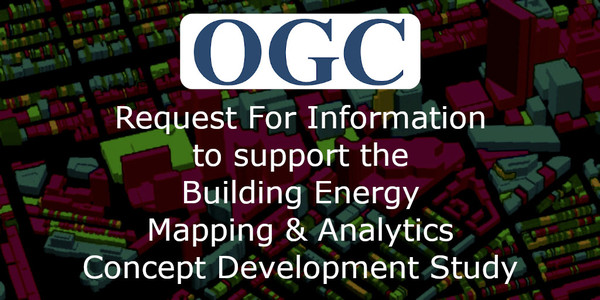New Concept Development Study aims to characterize the state of energy mapping and analytics, and propose practices and standards to improve efficiency and consistency.

The Open Geospatial Consortium (OGC) and Natural Resources Canada (NRCan) are requesting information to support the Building Energy Mapping and Analytics Concept Development Study (CDS). Responses are due April 3, 2020.
Mapping and analysis of the energy consumption of buildings is currently undertaken in Canada by local municipalities, energy utilities, and federal agencies independently and for various purposes and across different scales. These groups derive energy usage using many different sources and methods, yet fundamentally the data are the same: understanding of the building stock–the numbers, floor areas, and other characteristics of various building archetypes and how they impact energy usage.
Despite this commonality, there is little to no coordination between these groups, resulting in differing methodologies, duplication of effort, lost energy savings, and lost opportunities for climate change mitigation and resilience.
The Building Energy Mapping and Analytics CDS is addressing this challenge by first characterizing the state of development of energy mapping and analytics for building stock broadly; and then using this knowledge to inform and propose IT architectural practices and standards that enable consistent mapping and analytics of residential energy use and efficiency.
The information being sought by the Building Energy Mapping and Analytics CDS includes who undertakes building energy mapping & analysis work, what data they use, what building archetypes they make use of, how they develop and/or operate their models, and how the resulting analyses, maps, and applications could be, or are being, applied.
OGC and NRCan wish to hear from a wide range of respondents, including those affiliated with:
- Municipalities
- Provinces/Territories/States (or equivalent sub-national entities)
- Federal/National governments
- Regulatory bodies
- Consultants including geomatics, engineering, planning and design firms
- Academic institutions including research labs
- Utilities
- Federal or Territorial / Provincial Policy Organizations
- Non-governmental and/or charitable organizations
- Advocacy groups
While the Building Energy Mapping and Analytics CDS is being developed and undertaken in Canada, viewpoints from across the globe are requested and appreciated.
Selected responses to this request for information will be validated in a subsequent face-to-face workshop in Ottawa, Canada in early May, 2020. Results will be compiled in a study report for public release to be presented in two webinars (English and French) as well as in person at the OGC Technical Committee meeting in Montreal in June, 2020.
The Building Energy Mapping and Analytics CDS is being conducted under OGC's Innovation Program, a collaborative, agile, and hands-on prototyping and engineering environment where sponsors and OGC members come together to address location interoperability challenges while validating international open standards. Watch this short video on how OGC's Innovation Program can benefit your organization.
For more information on the Building Energy Mapping and Analytics Concept Development Study, including how to submit a response to the Request For Information [HTML], visit the project's page on the OGC website. Responses are due April 3, 2020.
About OGC
The Open Geospatial Consortium (OGC) is an international consortium of more than 530 businesses, government agencies, research organizations, and universities driven to make geospatial (location) information and services FAIR – Findable, Accessible, Interoperable, and Reusable.
OGC's member-driven consensus process creates royalty free, publicly available geospatial standards. Existing at the cutting edge, OGC actively analyzes and anticipates emerging tech trends, and runs an agile, collaborative Research and Development (R&D) lab that builds and tests innovative prototype solutions to members' use cases.
OGC members together form a global forum of experts and communities that use location to connect people with technology and improve decision-making at all levels. OGC is committed to creating a sustainable future for us, our children, and future generations.
Visit ogc.org for more info on our work.
“







